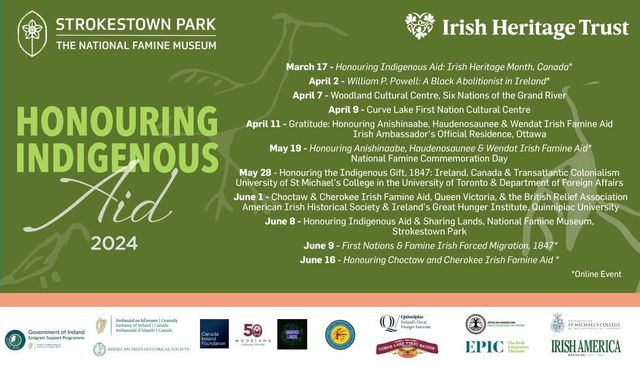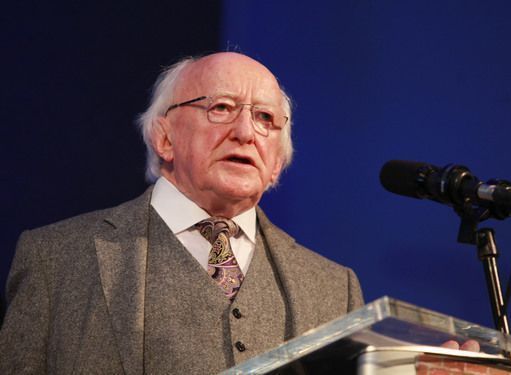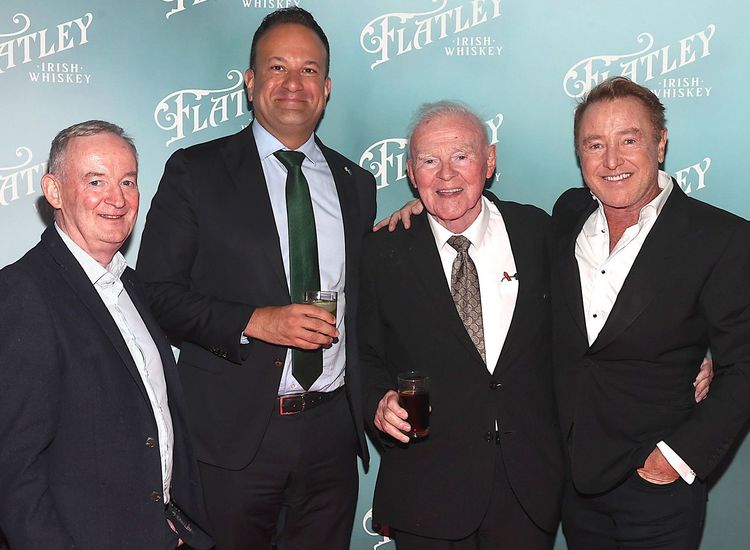Fulbrighter, file, first-class ambassador of the Irish language, community organizer…and the list goes on for Spiddal native, Seán Ó Coistealbha, as he draws to a close a year spent at Catholic University of America (CUA) in Washington DC.
“CUA was established in 1887. For a period of 25 or 30 years, I would say, CUA had one of the strongest faculties for the Irish language anywhere,” Ó Coistealbha told the Irish Echo.
“In 1905 the first phonographs for teaching the Irish language in the world were produced in CUA,” he adds. His knowledge of Irish American history knows no bounds, and he can throw out historical facts and dates like they happened yesterday.
Ó Coistealbha has worked tirelessly as a Fulbright Language and Teaching Assistant to seize every opportunity to share his beloved Irish language, hosting and attending more events and activities this academic year than most could manage in three.
“I would be one of the older Fulbrights but it's been a great experience. If you get invited somewhere you engage. It's connectivity,” says Ó Coistealbha.
The word ambassador doesn’t even begin to acknowledge what he has accomplished.
“What I’ve excelled at is being an ambassador because I’ve done about 15 shows. I’ve done some language programs for Daltaí na Gaeilge. Any show that’s going on, I put my hand up,” he says.
What a pleasure it was to join Connemara poet, Seán Ó Coistealbha for his Irish language class at @Harvard this morning. Bhain mé taitneamh as. Maith thú a Sheáin. pic.twitter.com/YHje2FopsB
— Daniel Mulhall (@DanMulhall) October 19, 2023
He has high praise for Irish American online and immersion teaching program Daltaí na Gaeilge where teachers work in a voluntary capacity because of their love and respect for the language.
"Daltaí na Gaeilge are a great organization. I can’t praise them high enough," he says. "I like what they're doing with the language. They organize weekends and most weekends have facilities to cater for the children."
An extraordinary interlocutor in both Irish and English, Ó Coistealbha decided that upon retirement as CEO of Muintearas, a Connemara Gaeltacht-based organization engaged in education, training, community development and youth work through the Irish language, that he would apply for a Fulbright.
“I retired in January 2023," he said. "I wrote about 15 references for Fulbrights throughout my career. During one reference, I said, when I retire this would be good. And that’s what I’ve done. It’s my retirement. 27 years in the trenches with male, pale and stale Irish civil servants, and I was ready,” he laughs — with that infectious sense of humor and passion imbued in everything he says.
Ní bheidh a leithéid arís ann springs to mind, and any student or person that has crossed his path this year will be the richer and more knowledgeable for it.
“Is there anybody on campus you don’t know?” asks his colleague, Professor Quinton Beck in the Catholic University’s Irish Language Department.
He even coached the university’s hurling team, CUA's Cardinals as he was a strong player himself when younger.
“We won the eastern conference hurling competition. First time ever,” he smiles, adding with a laugh: “And I taught them the black art of hurling."
But he added a cúpla focal to the hurling training as it was another opportunity to expose more young people to the Irish language. Ó Coistealbha takes every opportunity he sees to speak and teach Irish, knowing that once heard an Ghaeilge won't be forgotten.
“You have one of the best things you have for the rest of your life. You have a beautiful language. It has an inbuilt conveyor of wisdom: in poetry, in words. It’s an ancient language, four and a half thousand years old. You’ll rock and roll with it all your life,” he says.
His words, wisdom, and poetry have reached far beyond the classroom walls, and have touched the hearts and minds of many throughout the USA and beyond.
“Outside of the 14 pupils that have studied Irish here, I hope I’ve impacted maybe another 100 through some shows, through some of the poetry,” he reflects.
And many Gaeilgeoirí have indeed connected to the Irish language through his poetry. With two books of poetry, Dídean published in 2002, and Stadhan in 2012, another collection is in the works.
Ó Coistealbha has the mind of a poet as he paints pictures in his mind and speaks of people and events that are long gone with the precision, beauty, and clarity of someone seeing them for the first time today. As he says so beautifully in one of his poems, 'I gcuimhne cinn an ghasúir.'
He wrote his first poem as a young schoolboy and boarder from Conamara, as he looked out his window onto the Burren across the fields.
“The first poem I ever wrote was in boarding school. I had returned after the Christmas break, and I was looking out the window; it was about maybe a month or two in. It’s when spring was happening. Bhí an t-earrach san aer. And I looked out and in front of the study and I could see the Burren and I could see some of the fields there. And that was my first poem.”
Interestingly, his first poem was written in English, and now he can only write poetry in Irish.
“Now I can only write in Irish. Isn’t it amazing I can only now write in Irish, why? I cannot understand. Isn’t it amazing where that period of time comes when something in your mind just triggers over?” he reflects.
While some poets resist their poetry being translated into English and other languages, Ó Coistealbha does not, for it’s another opportunity for people to access the Irish language.
“Now, do I translate my poems? Every one of them,” he exclaims. “Or I have them translated, some of them by beautiful people.”
Every Friday morning at 12 noon Irish time and a brisk 7am start if you’re on the east coast, it’s Zoom time with a fascinating poetry class hosted by Ó Coistealbha, with people from Ireland, all-over North America, and across the world attending online.
He teaches the language through his poetry, and the class always opens with a casual and light-hearted chat tríd an Ghaeilge, putting everyone at ease, with plenty of scéaltaí beaga and always a laugh to be had, even if you haven’t had your dose of morning coffee.
Michael Gannon from Connemara FM Radio sets up the class, takes part and contributes to the class, and with a quick turnaround has the programs edited, out and broadcast later that day.
“I think we got a great injection of life in the class from Micheál as he tapes and edits the programs and people get a good kick out of it,” says Ó Coistealbha.
A sublime experience for anyone, whether you’re into poetry or not. Ó Coistealbha has words, old words, that have been lost or long forgotten from the language, and he blends them together in such a way, that quietly and quite suddenly a symphony is formed.
“I’ve words that aren’t in dictionaries that I learnt from great women and men,” he says.
He has his finger on the pulse of everything that is happening and developing in the Irish language, not only in Ireland, but in the USA and across the world. If ever there was a Minister for the Gaeltacht and Irish language required in the USA, he’s definitely the person for the job!
Ó Coistealbha’s own journey with the Irish language is both fascinating and encouraging.
“My mother was from the north. I spoke English before I spoke Irish,” he says.
Growing up in Spiddal in the 60s, Irish was the natural language everywhere from the lingua franca of the school yard to the local stores, but for a while he didn’t use it.
“I fell out of love with Irish at about 15 because of fanatics who would correct your Irish,” he says. “I re-engaged with the language in university in 1978. I was Reachtaire of An Cumann Gaelach. That was my road to Damascus. I found in university that hey, we’re in the minority here, so I’ve a tendency to join the minority. It’s an inbuilt DNA thing. It’s an Irish thing.”
Ó Coistealbha is not against grammar, but he doesn’t teach grammar.
“The spoken language is important,” he says. “And to me if you’re going to learn the language you have to emphasize that at all times. Grammar can come later.”
He believes that there are cultural doorways into the language, and these should be explored and exploited to gain access to the language. If the language is scaffolded through every aspect of Irish culture, then people will build and grow the language and fall in love with it, perhaps for the first time, or all over again.
“I think there’s seven or eight sisters of the language,” he says. “There’s folklore, there’s mythology, there’s song, there’s poetry, there’s placenames (logainmneacha), béaloideas, all of that. If you are into all the other dimensions of a language, you’re never going to forget it, especially music because it’s in your heart,” he reflects.
He's on trend with both young and old who are learning and speaking the language and knows there is room and a need for all generations to keep working at it and keep the language alive. He certainly has done his bit traveling across the USA and meeting many.
"I've met great heroes here," says Ó Coistealbha. "I've been enriched not only by the young people but by people like Jack O Brien that I've met here. Jack is 86 years of age but has more knowledge of the Irish here than anyone else I know."
“A language dies if it doesn’t change,” he adds. “There are great opportunities here in terms of the societies, in terms of the universities and in terms of an appetite to learn Irish, a genuine appetite to learn Irish. There’s reputedly about one million people learning Irish in North America at the moment,” he adds.
So, while he wraps up his jam-packed year, Ó Coistealbha leaves everyone in the Irish language scene, both here and in Ireland, with much food for thought.
“I’ve a bit of a dream where you get Irish centers like Portland Maine, Boston, Chicago, all over and where you get aging Irish Americans, great women and great men, aging. If we’d offer an intern program to people in Ireland who are good at culture, good at music, good at language or whatever and send them over to those centers for a year in a full-time capacity. That would be a great program,” he enthuses.
"The Irish men and Irish women who arrived in the Gulf of St. Lawrence in 1847 were heroes. They were great people. They carried Ireland in the purest way. They carried the language in the purest way. So, we owe those people now to go to all of those centers that are in North America or Canada and re-inject a bit of life. That would be my dream."
He’s been a breath of fresh air and a Gael-force wind for the language here in the USA, impacting all he’s come across and encouraging more people towards the language. There is undoubtedly more to come.
Ó Coistealbha concludes: "If you asked me, 'what would I like to have as the legacy of my days here?', it would be that I perhaps have left the spark of an idea amongst younger people."









